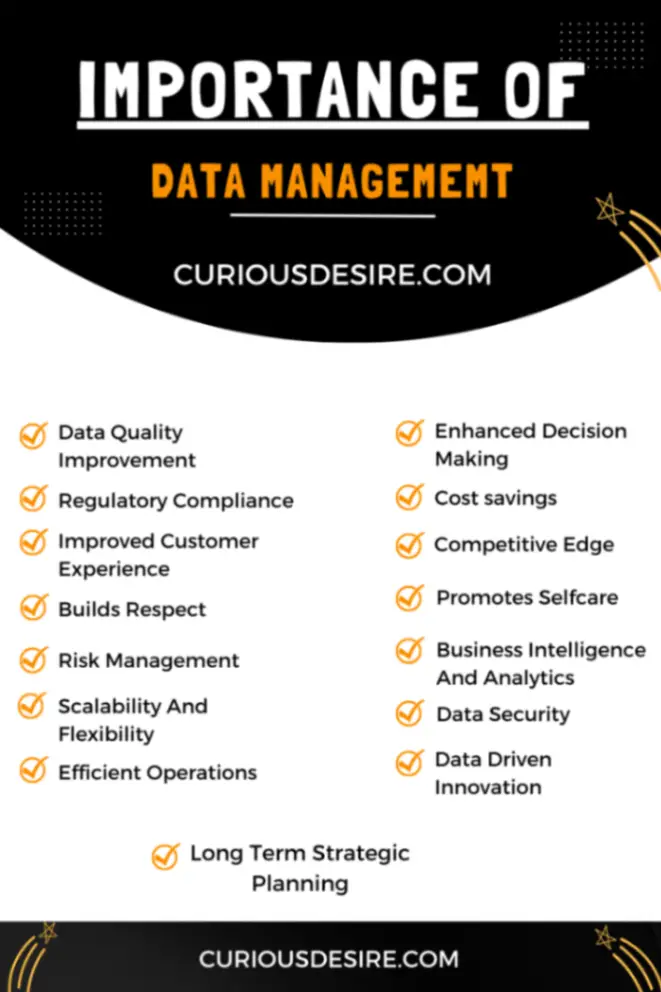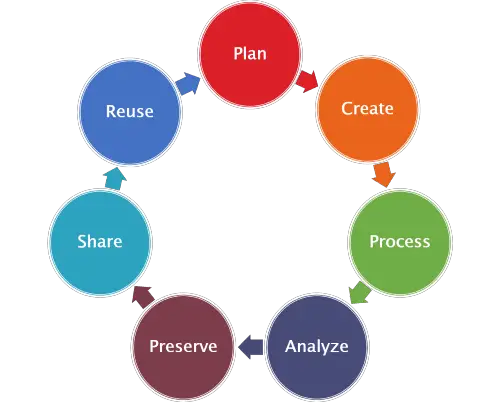Do you know that 80% of data analysts dedicate up to 50% of their working hours to the crucial task of cleaning and organizing data? This striking fact emphasizes the critical role of data management.
From customer information to operational metrics, the volume and variety of data being generated are unprecedented. As a result, the ability to manage, analyze, and leverage data effectively has become a critical factor in organizational success.
Data management isn’t just about storing bits and bytes in a database; it’s an intricate process that ensures information is accurate, accessible, and secure.
This blog sheds light on the fundamental importance of managing data. Keep on reading.
5 most common reasons for the importance of data management:
- Data Quality Improvement
- Scalability and Flexibility
- Disaster Recovery
- Data-driven Innovation
- Long-term Strategic Planning

1. Data Quality Improvement
One of the fundamental aspects of data management is ensuring the quality of the data. Poor-quality data can lead to
- Misinformation
- Misinformed decisions
- Operational inefficiencies.
Data management processes such as data cleansing, validation, and enrichment play a crucial role in improving data quality, thereby enhancing the reliability and trustworthiness of the information used for decision-making.
2. Enhanced Decision-Making
Data management provides you with the ability to extract meaningful insights from the vast sea of data.
By implementing robust data management practices, businesses can uncover valuable patterns, trends, and correlations, which in turn enable informed and data-driven decision-making. This, in turn, can lead to improved strategic planning, resource allocation, and operational efficiency.
3. Regulatory Compliance
In today’s increasingly regulated business environment, compliance with data protection laws and regulations is paramount.
Effective data management ensures that your organization has the necessary controls and processes in place to comply with data privacy regulations such as GDPR, CCPA, and HIPAA.
By adhering to these regulations, your business can mitigate the risks of non-compliance, including hefty fines and reputational damage.
4. Cost Savings
Proper data management can result in significant cost savings for organizations.
By eliminating redundant data, optimizing storage resources, and streamlining data processing workflows, businesses can reduce the operational costs associated with data storage, maintenance, and management.
Additionally, improved data quality can lead to lower error rates and rework, further contributing to cost savings.

5. Improved Customer Experiences
By collecting and analyzing customer data, organizations can gain a deeper understanding of their target audience, which in turn helps them make more informed decisions and improve overall customer satisfaction. It’s pretty fascinating stuff!
You can enhance personalization, marketing, and customer service by leveraging customer insights. This can drive customer loyalty and satisfaction, leading to increased retention and revenue.
6. Competitive Advantage
In today’s hyper-competitive marketplace, data management can be a source of sustainable competitive advantage. Businesses that effectively harness data to optimize their operations, innovate their offerings, and anticipate market trends stand to outperform their competitors.
They can more quickly identify trends, innovate, and adapt to changes in the market, giving them a competitive edge.
7. Risk Management
Data management plays a critical role in mitigating risks associated with data breaches, cybersecurity threats, and data loss.
By implementing robust data security measures, access controls, and data encryption, you can safeguard your sensitive information from unauthorized access and cyberattacks.
This proactive approach to risk management protects your business from potential financial, legal, and reputational damage.
8. Business Intelligence and Analytics
The foundation of effective business intelligence and analytics rests on sound data management practices.
By organizing and integrating data from disparate sources, you can create a unified view of their operations and performance.
This consolidated data can then be analyzed to derive actionable insights, identify opportunities, and drive operational improvements, thereby unlocking the full potential of business intelligence solutions.
9. Scalability and Flexibility
As businesses grow and evolve, their data management needs become more complex and demanding.
Effective data management strategies enable your organization to scale its data infrastructure, accommodate growing data volumes, and adapt to changing business requirements.
By building a flexible and scalable data architecture, your business can future-proof its data management capabilities and support its long-term growth objectives.
10. Data Security and Privacy
With the increasing frequency and sophistication of cyber threats, data security and privacy have become paramount concerns.
Data management encompasses the implementation of robust security measures, data encryption, access controls, and data governance frameworks to protect sensitive information from unauthorized access and misuse.
By prioritizing data security and privacy, you can uphold the trust and confidence of your customers and stakeholders.
11. Efficient Operations
Data management streamlines and optimizes data-related processes, leading to enhanced operational efficiency
By establishing data governance policies, data lifecycle management, and automation of data workflows, organizations can reduce manual effort, minimize errors, and accelerate decision-making.
This increased operational efficiency translates to improved productivity and resource utilization across the business.
12. Regulatory Reporting
In regulated industries such as finance, healthcare, and pharma, compliance with regulatory reporting requirements is a critical aspect of data management.
Effective data management enables organizations to compile, analyze, and report data in a timely and accurate manner, ensuring compliance with industry-specific regulations and standards.
This capability not only avoids regulatory penalties but also fosters a culture of trust and transparency.
13. Data-driven Innovation
Data management lays the foundation for data-driven innovation within organizations.
By harnessing data analytics, machine learning, and artificial intelligence, your businesses can uncover new opportunities, optimize processes, and develop innovative products and services.
14. Disaster Recovery
In the event of unforeseen disruptions or disasters, the ability to recover and restore critical data is essential for business continuity.
Effective data management includes robust backup and disaster recovery strategies to safeguard against data loss and ensure minimal downtime in the face of disruptions.
By having resilient data management practices in place, your organization can mitigate the impact of potential disasters and maintain business continuity.
15. Long-term Strategic Planning
Data management empowers you to take a proactive and strategic approach to planning and decision-making.
By capturing, organizing, and analyzing historical and real-time data, businesses can gain insights into long-term trends, market dynamics, and customer behavior.
These insights inform strategic planning, business forecasting, and risk assessment, enabling you to make informed decisions that align with your organization’s long-term objectives.
Challenges of Data Management
The increasing reliance on data across all sectors has elevated the importance of effective data management. However, organizations face numerous challenges in their quest to manage data efficiently.
1. Data Security
One of the foremost challenges is ensuring the security and privacy of sensitive data.
You must safeguard data from unauthorized access, breaches, and cyber-attacks, while also complying with data privacy regulations such as GDPR, CCPA, and HIPAA.
2. Data Quality and Integrity
Poor data quality can significantly impact decision-making and operational efficiency.
Managing data quality involves identifying and rectifying inconsistencies, errors, and duplicates, as well as ensuring data integrity throughout its lifecycle.
Implementing data quality management tools and establishing clear data governance processes can help address this challenge.

3. Data Governance
Establishing effective data governance practices to ensure compliance with regulatory requirements and industry standards is a major challenge. ‘
This involves defining data ownership, creating policies for data usage, and developing a framework for data stewardship.
Compliance with regulations and standards requires continuous monitoring and adaptation to evolving legal and operational landscapes.
4. Data Integration
In most organizations, data is stored in disparate systems and formats, making it difficult to integrate and analyze.
Implementing robust data integration tools and standardized data formats can help address this challenge.
5. Talent and Skill Shortages
There is a growing demand for professionals with data management, data science, and analytics skills.
However, the talent pool is often insufficient to meet the demand, leading to a skills gap that organizations struggle to fill.
6. Data Migration and Transformation
Your organization often needs to migrate data between systems, as well as transform data to fit new analytical or operational requirements.
Data migration and transformation challenges include ensuring
- Data consistency
- Maintaining data lineage,
- Minimizing downtime during the migration process.
Effective planning, testing, and data mapping are essential to overcome these challenges.
7. Data Scalability
As data volumes grow, ensuring the scalability and performance of data management systems becomes increasingly challenging.
It is essential to optimize data processing speed, query performance, and system responsiveness, particularly in the context of big data and real-time analytics.
Tips to Enhance Data Management
Enhancing data management is crucial for unlocking the full potential of data to drive decision-making, improve efficiency, and foster innovation.
Here are several practical tips to improve data management practices:
1. Establish Data Governance Policies
Implement a robust data governance framework that defines policies, standards, roles, and responsibilities related to data management.
These policies help in defining the roles, responsibilities, and processes for managing and using data within the organization.
2. Invest in Data Quality Management:
Data quality management involves processes and technologies aimed at ensuring that data is accurate, complete, and consistent.
Establish data cleansing, data validation, and data quality metrics to measure and monitor data quality over time.
3. Implement Robust Data Security Measures
Ensuring the security of data is crucial to protecting sensitive information from unauthorized access, breaches, and cyber threats.
Implement encryption, access controls, data masking, and regular security audits to identify and address potential vulnerabilities.
4. Embrace Cloud-Based Data Management Solutions
Cloud-based data management solutions provide scalability, flexibility, and cost efficiency for handling vast amounts of data.
By moving to the cloud, you can leverage cloud storage, databases, and analytics services to manage and analyze data more effectively.
5. Establish Data Retention and Archiving Policies
Defining data retention and archiving policies helps in managing the lifecycle of data, including the storage, preservation, and disposal of data according to legal and regulatory requirements.
This involves defining retention periods, archiving strategies, and data disposal procedures.
Conclusion
In conclusion, effective data management is a critical aspect of modern business operations. It stands as the cornerstone of operational efficiency, strategic decision-making, and competitive advantage.
By ensuring data is accurate, secure, accessible, and compliant with regulations, businesses can unlock its full potential, driving innovation, enhancing customer experiences, and fostering growth
Embracing the principles of good data management is not just a necessity but a strategic imperative for any organization aiming to thrive in the digital age.
Importance of Data Management FAQs
1. Why is data management important?
Data management protects your organization and its employees from data losses, thefts, and breaches with authentication and encryption tools. Strong data security ensures that vital company information is backed up and retrievable should the primary source become unavailable.
2. What is the goal of data management?
The goal of data management is to help people, organizations, and connected things optimize the use of data within the bounds of policy and regulation so that they can make decisions and take actions that maximize the benefit to the organization.
3. What are the key components of effective data management?
Effective data management consists of data governance, data quality management, data integration, master data management, data security, and data lifecycle management.
4. What are the technological tools used in data management?
Technological tools for data management include databases, data integration platforms, data governance tools, master data management systems, and data security solutions
5. How does data management impact customer relationships?
Effective data management enables organizations to better understand their customers, personalize marketing efforts, and provide better customer service, leading to improved customer relationships and loyalty.